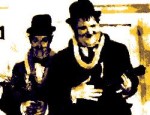Film Review
Director Philippe de Broca came close to fulfilling a longstanding
ambition to make a live action version of Hergé's
Tintin adventures when he made
L'Homme de Rio, an energetic
adventure-comedy that feels both like a send-up of the early James Bond
films and a precursor of Spielberg's Indiana Jones films.
Although the film was made on a fraction of the budget of a comparable
Hollywood offering, it looks impressively like a lavish blockbuster
production, thanks to its stunning location photography and some
exceptionally well choreographed action sequences. Only the cheap
and cheerful opening titles give the game away.
L'Homme de Rio reunited de
Broca with actor Jean-Paul Belmondo, their second collaboration after
the popular swashbuckler
Cartouche (1962). The
film was to mark an important milestone in Belmondo's career. His
first out-and-out hit, both at home and abroad, the film not only made
Belmondo a major international star but also established the screen
persona that would stay with him for the rest of his career. This
was the first occasion when the actor's penchant for stunt-work was
exploited to the full and, under the guidance of professional stuntman
Gil Delamare, Belmondo brought to the screen some of the most
impressive action stunts ever seen in a French film up until this point.
Partnering Belmondo in this Brazilian adventure romp is a suitably
feisty Françoise Dorléac, famously the sister of
Catherine Deneuve, whilst the villain of the piece is played with great
élan by Jean Servais, the star of Jules Dassin's film noir
masterpiece
Du rififi chez les hommes
(1955). Even though all of the characters are little more than
comic book caricatures, every member of the cast (Belmondo included)
resists the temptation to send up the film, with the result that
L'Homme de Rio is a respectable
action film punctuated by moments of humour, a far more attractive
proposition than those silly James Bond movies that were made in the
1970s.
L'Homme de Rio was a massive
box office hit when it was first released in France in 1964, attracting
an audience of 4.8 million. It also fared extraordinarily well on
its international release, particularly in the United States where it
received some very favourable reviews in the national press.
Overnight, Jean-Paul Belmondo became one of the best known French
actors of his generation and he was to remain one of French cinema's
greatest assets for the next two decades - decades which were dominated
by a genre for which the actor was particularly well suited, the
action-polar. Bébel had arrived.
© James Travers 2011
The above content is owned by frenchfilms.org and must not be copied.
Next Philippe de Broca film:
Un monsieur de compagnie (1964)
Film Synopsis
French air force pilot Adrien Dufourquet returns to Paris for a week's
leave just before his girlfriend, Agnès, is kidnapped. In
a desperate bid to rescue the woman he loves, Adrien pursues her
abductors and ends up on a plane bound for Rio de Janeiro. Upon
his arrival in Brazil, Adrien wastes no time in resuming his search for
Agnès and soon discovers why she was kidnapped. The
daughter of a renowned explorer, she alone holds the secret to a lost
treasure belonging to an ancient South American civilisation, a
treasure which someone will stop at nothing to possess...
© James Travers
The above content is owned by frenchfilms.org and must not be copied.



